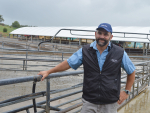Southland farmers are welcoming moves by the Government to repeal intensive winter grazing rules.
Federated Farmers Southland junior vice president and dairy farmer Jason Herrick says, not just for dairy farmers but every farmer using winter grazing, it is welcome news.
"We are glad to see these changes being made quickly, although unfortunately not in time for 2024 winter," he told Dairy News.
Herrick points out that some farmers will be disappointed, having to "go through the unnecessary, pointless consenting process".
He says the winter grazing rules introduced by the previous government were unnecessary.
"Farmers had already made significant changes and these regulations were a frustrating distraction that undermined goodwill," he says.
"The fact that common sense is finally prevailing will be a welcome relief though."
Herrick's message for farmers is to carry on showcasing good winter grazing practices.
"As a whole, the whole industry is as good as the bottom 5%. My message to farmers would be to carry on showing good practice and continue to innovate as we always have, to continue the improvements made to date/
"The risk of poor practice didn't change because of a consent process - that just put those who do the right thing through a whole lot of needless bureaucracy."
DairyNZ general manager farm solutions and policy Dr David Burger believes farmers can focus more on continuing to improve their wintering practices, through appropriate farm and catchment level solutions, rather than being concerned about national regulations, and associated costs, that may not be effective for their situation.
At the same time, DairyNZ encourages dairy farmers to check their regional council rules to ensure they still meet local regulations, which are additional to national rules.
Burger notes that current rules and consent requirements will also remain for the current 2024 winter season but be removed for the 2025 season.
"Dariy farmers have made significant improvements with their wintering practices in recent years, lifting the standards of animal care while working hard to protect the environment. We expect these improvements to continue."
Repealing intensive winter grazing rules is one of five changes included in the first Resource Management Act Amendment Bill to be introduced by the Government in May. The National Policy Statement for Freshwater Management (NPS-FM) is being reviewed and replaced, stock exclusion regulations in relation to sloped land will be amended and the NPS-IB requirement for councils to identify new Significant Natural Areas (SNAs) suspended for three years. The fifth change is aligning the consenting pathway for coal mining with the pathway for other mining activities in various regulations.
Agriculture Minister Todd McClay says Cabinet has agreed changes to stock exclusion and winter grazing regulations, representing a move to a more risk-based, catchment-focused approach.
“We’re proposing to remove the problematic and contentious low slope map and for regional councils and farmers to determine where stock need to be excluded, based on risk. The focus is on farm-level and regionally suitable solutions. This will reduce costs for farmers.
“Importantly, effective nonregulatory measures are already in place to support the continued improvement of winter grazing practices going forward.
“Sector groups have confirmed their continued and collective commitment to work alongside farmers and regional councils to ensure good outcomes.
“Regional councils tell us there have been significant improvements in winter grazing practices, with farmers changing where they plant fodder crops and how they manage winter grazing.
“The national requirement for farmers to obtain prescriptive and expensive winter grazing consents is being removed in time for the 2025 season, and instead being managed through good practice and regional council plans,” McClay says.


















